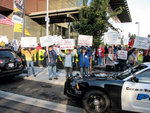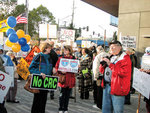

With signs objecting to a C-TRAN decision to fund light rail despite a public vote against it, 100-150 citizens protested outside the Vancouver Community Library Oct. 8 before and during a meeting of the C-TRAN board of directors.
The C-TRAN board voted 5-4 Sept. 26 to pay the cost of operating light rail in Clark County out of existing revenues.
C-TRAN had sought voter approval last year for a sales tax increase to pay for the operation and maintenance of light rail. That measure failed with a 56.5 percent “no” vote.
Light rail is slated to be a component of the Columbia River Crossing (CRC) bridge replacement project.
State Rep. Liz Pike (R-18) helped organize the protest rally, publicizing the event on Facebook and inviting those concerned about the C-TRAN board action to meet at the library and bring signs.
Pike, who had urged the C-TRAN board not move ahead with a TriMet agreement, said the board “made a terrible mistake” when approving the “hasty” contract. “The rally,” she said, “was in response to that egregious mistake. The rally was out of sheer frustration over that action.”
“We have to let them (C-TRAN board members) know that what they did was not right,” said Pike.
Pike said the agreement with TriMet is financially unsound. She said TriMet has $1.1 billion in unfunded pension obligations and it will be “hard for them to get out of their financial pinch.”
Pike said a TriMet annual report says that if the financial problems are not solved by 2024, the transit agency will have to cut service by 70 percent. She questioned what the 65,000 Clark County daily commuters would do then if left to rely on TriMet. “TriMet is not fit to be collaborated with on any type of transit project,” said Pike.
The C-TRAN agreement with TriMet provides that none of TriMet’s unfunded pension and medical benefits, or TriMet’s general administrative and overhead costs, are to be included in the calculation of C-TRAN’s light rail obligation.
Pike was critical of what she called the “Gang of Five” – the five of nine C-TRAN board members who approved the light rail plan. She said she believes that the CRC project will die in the Oregon legislature.
Mark Engleman, Vancouver resident and rally participant, accused CRC and light rail proponents of corruption and “doing damage to our community with the CRC mega-project.”
“The citizens are done,” said Engleman, promising a “level of action well in excess of what needs to get done to stop these people.”
“It’s unbelievable where they will go to get what they want,” said Engleman of light rail and bridge proponents.
Engleman described the CRC project with light rail as a “big ugly beast. Some say it can’t be conquered, but there are few scenarios in which it can survive.
“CRC is going down regardless,” said Engleman.
C-TRAN board member and Clark County commissioner David Madore argued that existing C-TRAN policy prohibits the diversion of existing C-TRAN revenues to fund light rail and that C-TRAN executive director Jeff Hamm signed the agreement with TriMet without the legal authority to do so.
According to Madore, the newly-signed contract between C-TRAN and TriMet gives TriMet the authority to order C-TRAN to use eminent domain powers to condemn properties from unwilling sellers and to transfer those properties to TriMet under threat of $5 million in liquidated damages for nonperformance. Both Madore and board chair Bill Ganley, a Battle Ground city council member, took exception to the eminent domain provisions of the agreement before it was passed Sept. 26.
The contract also allows TriMet to lay claim to future C-TRAN tax increases, said Madore. Both of these provisions are “new, unacceptable C-TRAN policy not authorized by the C-TRAN board,” argued Madore.
At the Oct. 8 meeting, Madore offered a Board Resolution that, had it passed, would have rescinded the agency’s light rail contract with TriMet. That Resolution was postponed by a vote of 5-3.
Among the signs displayed by protestors were:
“No Light Rail.”
“C-TRAN: Listen to the public.”
“Fire Hansen; Dump Leavitt.”
“No Bridge Tolls.”
“Bart Hansen supports bridge tolls and Crime Rail.”
“No CRC.”
“C-TRAN sold us down the river.”
“Where’s My Vote?”
“Tim Leavitt don’t know jack.”
“Honk to impeach.”
“Lose my ballot?”
C-TRAN plans to use a combination of sources to pay for annual light rail operating costs, estimated at $3.7 million in 2019, the first year of operation, and rising to $8.3 million by 2030.
Revenues from fares are expected to pay about 39 percent of C-TRAN’s share of operating costs in 2019 ($1.4 million), rising to 54 percent ($4.5 million) in 2030.
A portion of the remaining revenue is to come from shortening three bus routes now serving Delta Park in Portland from various locations in Clark County. In 2019, routes 4, 44 and 47 would end at the light rail station in Vancouver, saving the agency about $1.4 million.
The funding plan also includes sales tax revenues that would be realized from construction of portions of the CRC project on the Washington side of the state line. Such sales tax revenues are estimated at $390,000 in 2019.
About $400,000 of C-TRAN’s first-year obligation would come from an as-yet unidentified “third party” which could be another jurisdiction such as the city of Vancouver, partnerships with developers, or a new funding mechanism developed by the state legislature. Such “third party” revenues are estimated at $569,000 in 2030. By then, says the C-TRAN funding plan, revenues will fall short of costs by about $600,000 per year. No source of revenue is proposed to close that gap.
More information is available by calling C-TRAN spokesman Jim Quintana, (360) 696-4494, David Madore, (360) 601-3056, or Liz Pike at (360) 281-8720.
Marvin Case may be reached at (360) 687-4122 and via email at marvincase@msn.com.